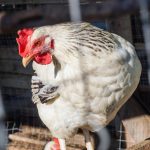Gnats, also known as nats, are small flying insects that can be harmful to chickens. These insects are attracted to moisture and organic matter, making chicken coops ideal breeding grounds. Gnats can cause stress and discomfort to chickens, leading to decreased egg production and health issues.
Gnats pose several threats to chicken health:
1. Disease transmission: They can carry and spread diseases such as avian pox and fowlpox, which can be fatal if untreated. 2.
Irritation: Gnats swarm around chickens’ eyes, nostrils, and other sensitive areas, causing agitation and stress. 3. Parasite transmission: They can transfer poultry mites and lice, which infest feathers and skin, causing itching and irritation.
4. Blood loss: In severe cases, gnat bites can lead to anemia in chickens due to excessive blood loss. Chicken owners should be aware of these risks and take preventive measures to protect their flocks from gnat infestations.
Proper coop maintenance, pest control, and monitoring chicken health are essential steps in mitigating the threat posed by gnats.
Table of Contents
- 1 Creating a natural barrier: Using plants and herbs to repel nats
- 2 Maintaining a clean coop: Tips for keeping nats away from chicken living spaces
- 3 Utilizing light traps: Using artificial light to attract and trap nats
- 4 Implementing natural predators: Introducing beneficial insects to control nats
- 5 Using chemical repellents: Safe and effective options for keeping nats at bay
- 6 Monitoring and adjusting: Regular checks and adjustments to ensure nats stay away from chickens
- 7 FAQs
- 7.1 What are nats and why are they a problem for chickens?
- 7.2 How can nats be kept away from chickens?
- 7.3 What are some natural repellents for nats?
- 7.4 How can the chicken coop be kept clean and dry to deter nats?
- 7.5 Are there any commercial insecticides that can be used to keep nats away from chickens?
Key Takeaways
- Nats pose a significant threat to chickens, causing irritation, stress, and potential disease transmission.
- Planting herbs and using natural barriers can help repel nats from chicken coops and living areas.
- Regular cleaning and maintenance of chicken coops is essential for keeping nats away.
- Light traps can be an effective method for attracting and trapping nats in chicken living spaces.
- Introducing natural predators like beneficial insects can help control nats in a safe and sustainable way.
Creating a natural barrier: Using plants and herbs to repel nats
Natural Insect-Repelling Plants
One effective way to repel nats from chicken coops and outdoor living spaces is by using plants and herbs that naturally repel these pesky insects. Certain plants and herbs have natural properties that deter nats and other flying insects, making them an excellent addition to the chicken coop environment. Plants such as lavender, mint, basil, and rosemary are known for their insect-repelling properties and can be strategically planted around the coop to create a natural barrier against nats.
Benefits of Insect-Repelling Plants
These plants not only add a pleasant aroma to the coop but also serve as a natural deterrent for nats and other unwanted pests. In addition to their insect-repelling properties, they also provide a safe and healthy environment for chickens.
Essential Oils as Natural Repellents
In addition to planting insect-repelling herbs, chicken owners can also use essential oils derived from these plants to create natural repellents for nats. Essential oils such as lavender oil, peppermint oil, and eucalyptus oil can be diluted with water and sprayed around the coop to create a natural barrier against nats.
Maintaining a clean coop: Tips for keeping nats away from chicken living spaces

One of the most effective ways to keep nats away from chicken living spaces is by maintaining a clean and dry coop environment. Nats are attracted to moisture and organic matter, so it is crucial for chicken owners to keep their coop clean and free of any potential breeding grounds for these pests. Regularly cleaning out bedding, removing any spilled feed or water, and keeping the coop well-ventilated can help reduce the risk of nats infesting the area.
Additionally, using moisture-absorbing materials such as diatomaceous earth or sand in the coop can help keep the environment dry and less attractive to nats. Another important aspect of maintaining a clean coop is proper waste management. Chicken droppings and other organic waste can attract nats and other flying insects, so it is essential to regularly remove and dispose of waste from the coop area.
Using a deep litter method with proper ventilation can help manage waste effectively while minimizing the risk of attracting nats. By keeping the coop clean, dry, and free of organic matter that attracts nats, chicken owners can significantly reduce the risk of infestations and provide a healthier living environment for their flock.
Utilizing light traps: Using artificial light to attract and trap nats
Light traps are an effective method for controlling nats in chicken coops and outdoor living spaces. Nats are attracted to light, so using artificial light traps can help lure these pests away from the chickens and trap them before they have a chance to infest the area. Light traps typically consist of a bright light source placed in a dark container or enclosure with a sticky surface that captures the attracted insects.
These traps can be strategically placed around the coop area to attract and trap nats, reducing their population and minimizing the risk of infestations. In addition to traditional light traps, chicken owners can also use UV light traps specifically designed to attract and capture flying insects such as nats. These traps emit UV light that is highly attractive to nats, drawing them in and trapping them on adhesive surfaces or electric grids.
UV light traps are an effective and chemical-free method for controlling nats in chicken coops, providing a safe and environmentally friendly solution for keeping these pests at bay. By utilizing light traps, chicken owners can effectively reduce the population of nats in their coop environment and provide a more comfortable living space for their flock.
Implementing natural predators: Introducing beneficial insects to control nats
Introducing natural predators of nats into the chicken coop environment is another effective method for controlling these pests. Beneficial insects such as ladybugs, lacewings, and predatory mites are natural predators of nats and can help keep their population in check. These beneficial insects can be introduced into the coop area or outdoor living spaces to prey on nats and other unwanted pests, providing a natural and sustainable solution for pest control.
Additionally, attracting birds such as swallows or purple martins to the area can also help reduce the population of nats, as these birds are known for feeding on flying insects. In addition to introducing natural predators, creating a diverse and balanced ecosystem around the coop can help naturally control nats and other pests. Planting native flowers and shrubs that attract beneficial insects can help create a habitat that supports natural pest control mechanisms.
By promoting biodiversity and natural predator-prey relationships in the coop environment, chicken owners can reduce the risk of nats infesting the area while maintaining a healthy and sustainable ecosystem for their flock.
Using chemical repellents: Safe and effective options for keeping nats at bay

Traditional Insecticides for Nat Control
For chicken owners dealing with severe nat infestations or seeking additional control methods, safe and effective chemical repellents are available on the market. Insecticides specifically formulated to target flying insects like nats can be used to treat the coop area and outdoor living spaces, providing an additional layer of protection against these pests. It is crucial for chicken owners to choose insecticides safe for use around poultry and follow all label instructions carefully to ensure the safety of their flock.
Natural and Organic Repellents for Nat Control
In addition to traditional insecticides, natural and organic repellents are available that are safe for use around chickens. Products containing ingredients like citronella oil, neem oil, or pyrethrin derived from chrysanthemum flowers can effectively repel nats while minimizing the risk of exposure to harmful chemicals. These natural repellents provide a safe and environmentally friendly solution for keeping nats at bay while ensuring the health and well-being of the flock.
Safe and Responsible Use of Chemical Repellents
It is essential for chicken owners to carefully research and select chemical repellents safe for use around poultry and follow all recommended guidelines for application. This ensures the safety of the flock and prevents any potential harm from the use of chemical repellents.
Monitoring and adjusting: Regular checks and adjustments to ensure nats stay away from chickens
Once preventive measures have been implemented to keep nats away from chickens, it is crucial for chicken owners to regularly monitor the coop environment and make any necessary adjustments to ensure that these pests stay at bay. Regular checks for signs of nats infestations such as swarming around feeders or waterers, as well as observing any behavioral changes in the flock due to pest irritation, can help identify potential issues early on. If signs of nats infestations are detected, adjustments such as increasing light trap placement or introducing additional natural predators can be made to address the problem effectively.
Furthermore, maintaining good hygiene practices in the coop environment is essential for preventing nats infestations. Regularly cleaning out bedding, removing waste, and keeping feeders and waterers clean can help minimize the risk of attracting nats to the area. Additionally, ensuring proper ventilation and moisture control in the coop can help create an environment that is less attractive to nats and other flying insects.
By regularly monitoring the coop environment and making necessary adjustments, chicken owners can ensure that their flock remains protected from nats and other potential pests. In conclusion, nats pose a significant threat to the health and well-being of chickens, making it essential for chicken owners to take proactive measures to keep these pests at bay. By understanding the dangers of nats for chickens and implementing a combination of natural, chemical, and mechanical control methods, chicken owners can effectively reduce the risk of infestations while providing a healthier living environment for their flock.
From creating natural barriers using plants and herbs to utilizing light traps, introducing natural predators, using chemical repellents, and regularly monitoring the coop environment, there are various strategies available for keeping nats away from chickens. By taking a comprehensive approach to pest control and staying vigilant in monitoring and adjusting preventive measures, chicken owners can ensure that their flock remains protected from the dangers of nats.
If you’re looking for tips on how to keep nats away from your chickens, you may also be interested in learning about the best design for a farmhouse chicken coop. Check out this article for some great ideas on creating a comfortable and functional living space for your feathered friends.
FAQs
What are nats and why are they a problem for chickens?
Nats are small, flying insects that can be a nuisance to chickens. They can irritate the chickens, cause stress, and potentially transmit diseases.
How can nats be kept away from chickens?
There are several methods to keep nats away from chickens, including using natural repellents such as herbs and essential oils, keeping the chicken coop clean and dry, and using commercial insecticides if necessary.
What are some natural repellents for nats?
Natural repellents for nats include herbs such as lavender, mint, and basil, as well as essential oils like citronella, eucalyptus, and lemongrass.
How can the chicken coop be kept clean and dry to deter nats?
Regularly cleaning the chicken coop, removing any standing water, and ensuring good ventilation can help keep the coop clean and dry, making it less attractive to nats.
Are there any commercial insecticides that can be used to keep nats away from chickens?
Yes, there are commercial insecticides specifically designed for use around chickens that can help control nats. It’s important to carefully follow the instructions and ensure the product is safe for use around poultry.
Meet Walter, the feathered-friend fanatic of Florida! Nestled in the sunshine state, Walter struts through life with his feathered companions, clucking his way to happiness. With a coop that’s fancier than a five-star hotel, he’s the Don Juan of the chicken world. When he’s not teaching his hens to do the cha-cha, you’ll find him in a heated debate with his prized rooster, Sir Clucks-a-Lot. Walter’s poultry passion is no yolk; he’s the sunny-side-up guy you never knew you needed in your flock of friends!







